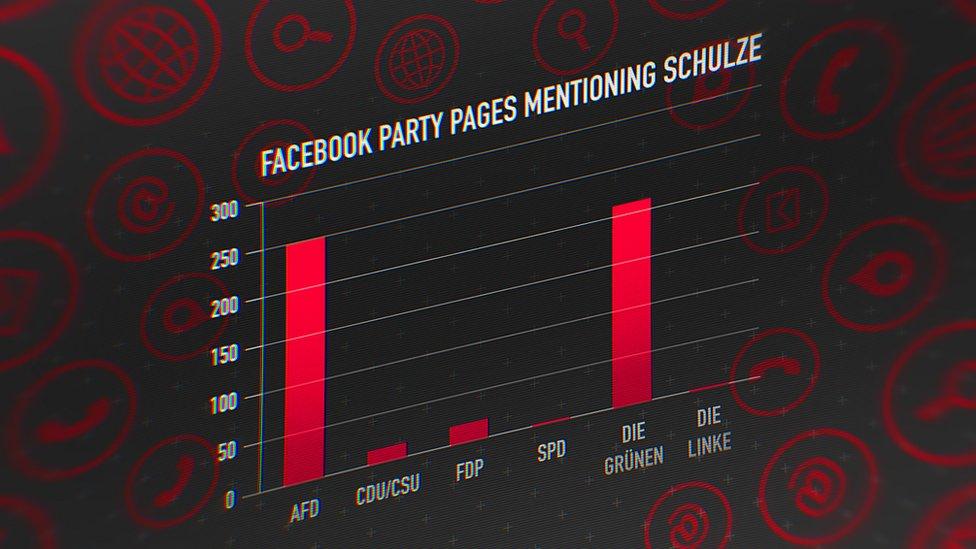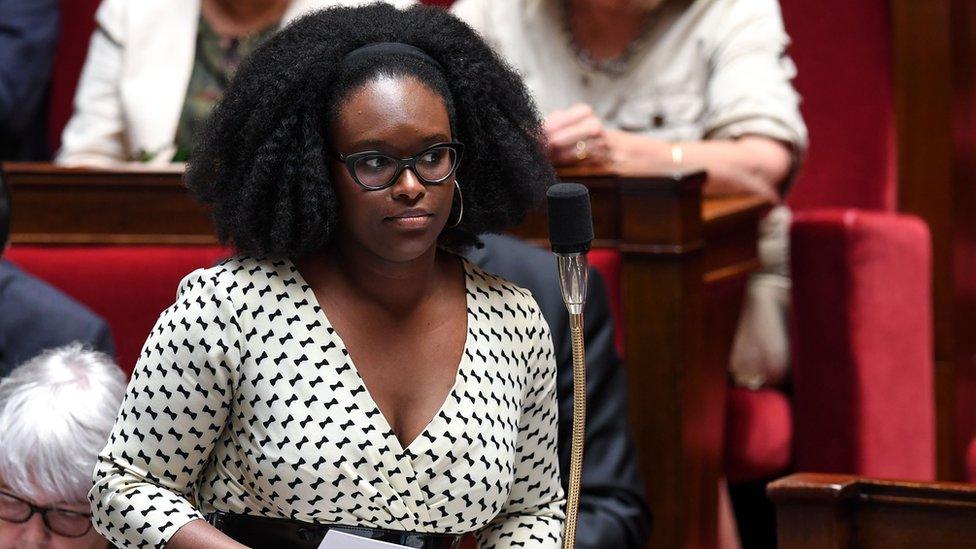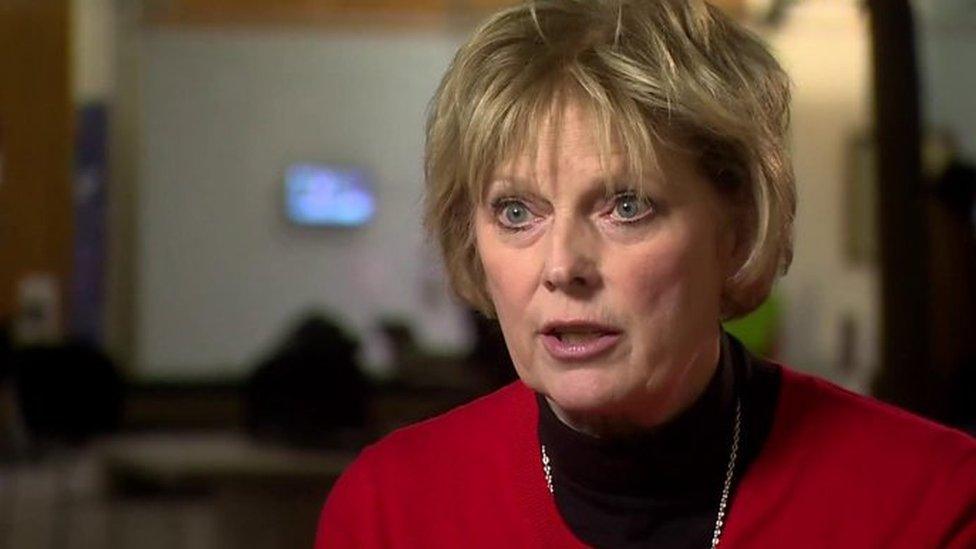A web of abuse: How the far right disproportionately targets female politicians
- Published

Abuse of female politicians is rife online - and much of it is being directed by established far-right groups and figures, a Newsnight investigation has found.
Female politicians across Europe have been targeted with threatening and misogynist content.
On both mainstream and fringe social media platforms, analysis of selected profiles found women in politics faced frequent comments targeting their gender, race and physical appearance.
According to Newsnight's investigation, which used comparative studies of politicians in the UK and Europe, the abuse aimed at female MPs exceeds that directed at their male counterparts, and differed in its focus and content.
Newsnight worked with the Institute for Strategic Dialogue (ISD), a think tank that investigates online extremism and polarisation, to examine the nature and content of comments about prominent politicians across Europe.
These politicians were either newly elected, and/or vocal about abuse they receive online. Newsnight and the ISD then analysed political figures who were of a different gender, heritage or political background to determine differences in the nature of the abuse they received.
The investigation revealed evidence that female figures receive proportionately more abuse than their male counterparts - and that a significant proportion of it takes the form of misogynistic and violent anti-female vitriol.
In Germany, Katharina Schulze, the leader of the Greens in Bavaria, has been a target of abuse from prominent far-right figures and influencers in recent months.
The Facebook page of the German far-right party Alternative fur Deutschland (AfD) has posted disproportionately about Ms Schulze, mentioning her in almost 10 times more posts than any other individual German political figure or party the year to April 2019 and four times more than all other references combined.
On Facebook, the AfD mentions Ms Schulze more than her own party does.

Posts comment on how Ms Schultz feels "threatened by white men", who she should be thanking as they have allowed "young ladies like her to achieve whatever they want." Others describe her as "racist and anti-German".
Many of the comments in response to these posts are sexualised and a handful imply that the authors wish she was raped.
Appearance and sexuality
Ms Schulze also receives abusive emails, including threats to sexually assault her. Some emails criticise her support for immigration by telling her to sleep with immigrants.
Schulze estimates that on average 20% of the messages she receives every day are abusive.
Over a quarter of the abuse she receives on mainstream social media platforms likewise focuses on her physical appearance, gender and sexuality. Tweets encourage her to sleep with immigrant men, as well as calling her fat.
Ms Schulze's co-leader of the Greens in Bavaria, Ludwig Hartmann, is not subject to the same kind of comments despite sharing similar views on immigration. Criticism generally centres around his party, with tweets calling him a "communist" who appeals to "young inexperienced voters".
On fringe far-right platforms, like 4chan's "politically incorrect" board users post memes targeting Ms Schulze's appearance and reputation. These include a Photoshopped picture of Ms Schulze doing a Nazi salute and other posts mocking her weight.
What about abuse of male politicians?
It is difficult to quantify how much this purposefully co-ordinated abuse of Ms Schulze by established far-right pages and figures contributes to the misogynistic abuse she experiences online.
Like the posts on the AfD Facebook page, content targeting Ms Schulze from far-right groups does not always focus on her gender, but does centre disproportionately on her relative to male politicians.
The targeting of Ms Schulze comes as part of what Cecile Guerin, a researcher at the ISD, describes as "concerted efforts by far-right groups to target, abuse and humiliate female politicians."

Katharina Schulze has been targeted much more than her male colleagues
The leader of the AfD in Bavaria, Martin Sichert, is also subject to abuse online, but criticism centred around his political views as opposed to his appearance.
Recent comments on Twitter describe his policies as "nonsense" and label him a "pathetic racist" and a Nazi.
Mr Sichert says he has also been targeted with comments aimed at his physical appearance including "usual leftist insults like 'fat brown pig' on social media."
He told Newsnight: "The hate speech of the media, other parties, churches, trade unions and other organizations against the AfD and those people who have an opinion on migration issues differing from the left mainstream, leads increasingly… to online abuse."
Our investigation showed that he received less frequent abuse about his appearance, and fewer sexualised comments, than Ms Schulze.
Ms Schulze told Newsnight: "As a woman in politics people treat you and harass you in a very different way.
"In complete disregard of my achievements as a politician, people online talk about my age, my body and my appearance, as well as what they wish upon me. I'm either too fat, too short, too blonde or too young," she said.
Who else gets abuse?
Ms Schulze's case is not an isolated one.
For one French politician, the abuse focuses predominantly on her physical appearance and her heritage.
Within hours of Sibeth Ndiaye's nomination to become France's first black government spokesperson, far-right online profiles started spreading disinformation and abusive content about her on Facebook, Twitter and 4chan.
In the two weeks following her nomination, 22.7% of the messages she received on Twitter were abusive, including misogynistic and racist content, according to the ISD's analysis.
On Twitter, users affiliated with far-right groups disseminated disparaging comments about Ms Ndiaye's background, appearance and skin colour, including: "Who does she think she is with her afro haircut? In her village in Senegal?! Well, no, we're in France this is just another provocation by this buffoon. Just because she is black doesn't mean she is entitled to doing anything she pleases."
There were other, much more extreme threats and messages.

Online abusers have particularly focused on Ms Ndiaye's hair.
Multiple Facebook posts on far-right groups attacked Ms Ndiaye's physical appearance, particularly her choice of clothes and hair. These posts appeared on far-right Facebook pages including political party Rassemblement National, and the group Droite Nationale.
Ms Ndiaye's promotion also became a talking point for the international far-right beyond France. The investigation found multiple examples of abuse on English-speaking channels on the messaging app Telegram.
Meanwhile, male politicians in France like Jordan Bardella - who as head of Rassemblement National's list in the European elections was thrust into the political limelight at a similar time to Ms Ndiaye - received abuse of a different kind.
After sharing a story of a young man allegedly killed by Algerian nationals, he received tweets such as "what shameful recuperation, Shame on you," along with a curse word, as well as other expletives under photo of him with far-right leader Marine Le Pen.
Cecile Guerin for Newsnight
Abusive and misogynistic language is also widespread on large social media platforms in the UK. Female MPs including Anna Soubry and Diane Abbott have been targeted with abusive content on fringe platforms such as 4chan, as well as abuse on Twitter.
While over 75% of the abusive posts MP Dominic Grieve received on Twitter accused him of "treason", none of the Tweets reference his gender. Anna Soubry - another Remain supporting MP - received almost double the number of abusive tweets, and half of these focused on her gender, according to ISD researchers.
The ISD's misinformation and disinformation work is funded from a range of sources including Open Society Foundations, external, LSE's Institute for Global Affairs Arena Programme, external, Facebook, and The Hilda & Preston Davis Foundation, external.
A Facebook spokesperson told Newsnight: "Targeted abuse towards politicians has no place on our platform and we are working hard to remove it. We recently introduced the removal of gendered cursing targeted at public figures and will continue to remove hate speech or credible threats of any kind. We've met with a number of female politicians to share guidance on how they can protect their pages, hide or delete abusive comments, and keep safe online. We have dedicated channels for politicians to contact us if they are concerned about any content on Facebook."
Nick Pickles, senior public policy strategist at Twitter, said the company's "philosophy is to take a behaviour-led approach, utilizing a combination of machine learning and human review to prioritize reports and improve the health of the public conversation.
"We increasingly look at how accounts behave before we look at the content they are posting."
The AfD declined to comment. 4chan did not respond to Newsnight's request for comment.
You can follow BBC Trending on Twitter @BBCtrending, external, and find us on Facebook, external. All our stories are at bbc.com/trending.
- Published30 May 2019

- Published5 October 2016

- Published21 June 2019
